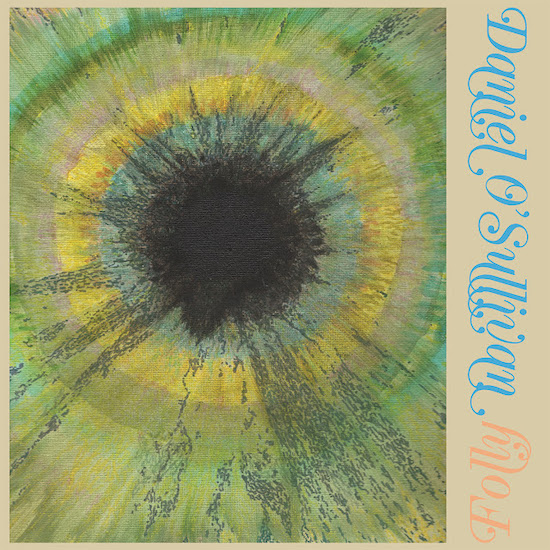Listening to the songs on Folly is like having Daniel O’Sullivan read fragmented excerpts from his life – real and imaginary – aloud in his slightly ethereal tones. His voice is most often gentle and mellow, reaching for the emotional core of his stories, rather than plunging into over-obvious highs and lows. His is a steady narration, one that can drift into contemplation or lead the listener off into unexpected bywaters, slipping subtly into a recursive electronic lope, shifting into places where the effects reveal new and brightly sparkling landscapes of heightened senses or ruminative considering.
Thighpaulsandra’s production is pristine throughout, and there are subtle nuances and shifting audio shadows that underpin the twinkling pastorale of ‘Rattleman’ and the frozen reverberations of ‘Honour Wave’ that reveal O’Sullivan’s avant-garde sensibilities – well developed in performances with the likes of Charlemagne Palestine or This Is Not This Heat and as a member of Grumbling Fur and Laniakea – have not been left behind in the richly constructed orchestrations and gleaming torch-song polish that grace these songs. He deploys a richly descriptive panoply of images in his songs: "When you look inside to face the truth", he sings on ‘Time Elapsing Blue’, and there’s certainly plenty of inner-space contemplation here, from the remembrances of times and people past on ‘Rattleman’ to the bucolic ode to hedges, plants and trees of ‘Utopiary’, as seen through "sidereal living room curtains". ‘Penny Rag’ rolls along, expansive and heading for who knows quite where, while ‘Silhouette’is a rumbling musing on mirror-reflected altered / alternate realities, piano and guitar intertwining and crossing over in a tune that would seem right at home while being rendered profound before a crowd bathed in candlelight and warmed by velvet furnishings.
Sleights-of-hand are plentifully but subtly applied, such as when words flow in bubbling streams of consciousness that hint at rather than tell the story directly, while the music surges into a fulsome ocean of melodic bounty. Sometimes this can become as pungently overpowering as the "perfume that fades from the air" referenced by ‘Utopiary’, almost as much as its fragrantly flanged guitar swell that reaches upwards for the sunlight, bathed in a mellow surge of Mellotronic loveliness. It is is a sign of Folly‘s effectiveness that it frequently feels physically impossible to place attention anywhere else while being swept up almost bodily into one of the many hypnotic moments on an album where time becomes secondary to inhabiting O’Sullivan’s word- and music-streams of effulgent, charismatic genius.
"She pointed to the stars", he recounts on ‘Amnion’ "and that’s where you came from"; sometimes on Folly it seems that, like a participant observer from another world, maybe Daniel O’Sullivan did too.



